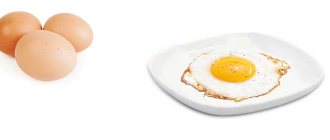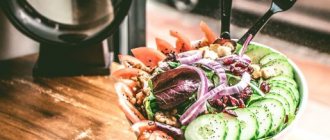Negative effects of sugar on the human body
The ability to get rid of extra centimeters at the waist is not at all the main reason why you should give up store-bought sweets.
- High calorie foods. It affects not only weight, but also the entire functioning of the gastrointestinal tract.
- Development of type 2 diabetes mellitus. High sugar consumption with insulin resistance provokes this disease*.
- Cleaning receptors. Soon after giving up a lot of sweets in your diet, you will be able to recognize the real taste of foods.
- Clean skin. Sweets provoke the appearance of acne and other problems with the epidermis.
- Healthy teeth. Plaque on teeth is, as a rule, sugar that has not had time to break down and provokes the appearance of caries.
- Increased energy. Sugar increases the production of dopamine, but this effect is short-lived, followed by a loss of strength.
- Thrush. Carbohydrate foods provoke an increase in fungal activity.
Why is it hard for us to give up sweets?
If you can't stop eating chocolate and other high-sugar foods, it's not a sign of weakness. In simple terms, eating sweets releases neurotransmitters (dopamine and opioids), which encourage you to eat even more delicious things on a hormonal level. How to stop eating sweets? Find your own (legal and safe, of course) way to stimulate dopamine production.
Fighting sweet addiction: 5 effective ways
If your relationship with sweets and starchy foods has become truly toxic, you cannot stop eating desserts uncontrollably, but at the same time your health is already begging for mercy, then it’s time to take the problem seriously.
There are several effective ways that help reduce cravings for flour and sweets and stabilize blood sugar levels.
Protein products are a real salvation
The first thing nutritionists from all over the world say when they mention “sweet addiction” is to diversify your diet with protein. Protein helps normalize blood sugar levels while maintaining energy at the desired level.
IMPORTANT! You need to think through your menu so that you consume at least 15–20 g of protein at each meal. This is enough to make you feel full without overloading your digestion.
Foods that contain the right amount of protein:
- The required amount of protein is found in cottage cheese (100 g), chicken breast, and shrimp (150 g).
- Lean beef, fish dishes, and turkey are perfect for consumption.
- If you are vegetarian or vegan, then turn your attention to legumes, quinoa, seeds, nuts and tofu.
- You can also diversify your diet with various protein mixtures and bars. An ideal option for those who play sports and expend a lot of energy in the gym.
More healthy fats
To ensure that giving up an abundance of sweets does not lead to energy depletion of the body, you need to maintain a balance of carbohydrates and fats. At the same time, fats should be extremely healthy!
These compounds are found in the following products:
- avocado;
- olives;
- nuts and nut mixtures;
- flaxseed oil and flaxseed;
- chia seeds;
- fish (but only those found in cold seas);
- coconut oil (the most suitable product of all).
All of these foods contain monounsaturated fats and polyunsaturated omega-3 fatty acids. The exception is coconut oil, which is a source of saturated fat (which can also be healthy).
IMPORTANT! Quality coconut oil contains 62% medium chain fatty acids. However, 91% of the fat in coconut oil is healthy saturated fat. They are instantly burned by the body, giving it energy and speeding up metabolism.
So every time you feel a craving for something sweet or starchy, run to the refrigerator, scoop up a spoonful of coconut oil and enjoy its delicate taste and satisfy your sugar hunger.
Other foods containing essential fats can be included in your weekly diet in unlimited quantities.
Not a day without fiber
Fiber helps not only fill the body faster, but also reduce appetite. At the same time, the compound does not contain calories, helps cleanse the intestines of waste and toxins, and protects the body from the proliferation of candida (which, by the way, is one of the reasons for dependence on sweets and starchy foods).
IMPORTANT! You should consume approximately 35–50 grams of fiber each day. Most people who adhere to the wrong diet do not even reach 15 g.
If you really set yourself the goal of getting rid of your sweet addiction, then diversify your diet with foods containing a large amount of fiber:
- fresh vegetables (broccoli, cauliflower and Brussels sprouts);
- nuts and nut mixtures;
- seeds (chia, flax);
- a variety of cereals (oatmeal, buckwheat, spelt);
- bran (oat);
- apple pectin (so don’t deny yourself the pleasure of eating jelly).
Add fermented milk products and probiotics to your menu
Any fermented milk products (in particular, kefir and natural yoghurts) contain beneficial bacteria, which are called probiotics. The beauty of probiotics is that they reduce cravings for sweets, starchy foods, and simple carbohydrates in general (alcohol also falls into this category).
Like fiber, fermented milk products help regulate the population of candida, which inevitably settles in your intestines with uncontrolled consumption of sweets.
If you don't particularly like kefir, then switch to pickled vegetables. Acidic foods can naturally reduce cravings for sweets because they also contain probiotics.
Which products to choose:
- sauerkraut;
- kimchi;
- kvass;
- unfermented varieties of apple cider vinegar;
- pickles.
IMPORTANT! You can use dietary supplements containing probiotics (for example, in capsule form) or make your own homemade yogurt from them.
Swap sugar for stevia
If you just can’t live without sweet tea or coffee, try adding a sugar substitute to these drinks – stevia extract.
IMPORTANT! Stevia is a natural plant-based sweetener that contains no calories. At the same time, the additive is not a food source for bacteria and parasites, which is sugar.
This natural sweetener contains antifungal and antibacterial substances, does not cause insulin release, and normalizes blood glucose levels. In addition, the additive is highly soluble in water and tolerates high temperatures. Long-term use of stevia does not cause addiction.
Sweet addiction is a disease of more than one generation. Many people, who have been accustomed since childhood to the principle “sweets help fight all problems in the world,” continue to adhere to such positions in adulthood, causing significant harm to their health. But addiction to flour and sweets must and can be overcome. It is enough to decide on the root cause of its occurrence, and then use the tips given above, which have already helped more than a dozen people forget about the “sugar needle”.
Reasons for eating a lot of sweets
- Unbalanced diet
. When trying to lose weight, many people resort to diets or full-fledged hunger strikes, which is fraught with inevitable failures. - Habit of overeating.
Some eat while doing something, and don’t think about food at all. A person simply does not notice that he eats out of boredom, and not out of real hunger. - Active brain activity
. Mental work requires huge amounts of glucose. The easiest way to get it is from chocolate or other store-bought sweets. - Critical days
. During menstruation, women's hormonal levels change, which also increases cravings for sweets. - Regular stress
. The brain knows that a dose of chocolate is a quick way to get a lot of dopamine, which means getting rid of sadness, anxiety or nervous tension.
How to get rid of cravings for sweets and starchy foods - psychology to help
Changing your diet is not an easy process. One of the best helpers in this is psychology, which will tell you how to give up sweets and starchy foods forever. There are tricks and tricks that will make it easier to remove harmful foods from your diet.
The first way is to change your attitude towards food . Always remember that this is a source of strength, and we eat to maintain life. Food cannot make us completely happy.
If you find it very difficult to refuse treats, then try to think of them as poison . To some extent, this is true; now many harmful ingredients are added to sweets. Knowing what is in their composition and how they are produced can suppress your appetite for a long time.
Important! When eating, always think only about food. No books, TV or computer. If you are distracted, you won’t notice how you eat too much.
You might be interested in: How to learn to control your appetite, and why do you want to eat all the time?
Try to change your attitude towards yourself . When people go on a diet, they often begin to feel sorry for themselves and think that this is a kind of punishment. Give up these negative thoughts and accept that giving up sweets will do you a lot of good and there is nothing wrong with it.
Find your motivation . It is important to know why you are refusing treats. Many people do this to prepare for the summer, wedding, or other event. The desire to become attractive, as well as the desire to feel good, will help. Always remember your goal when you are craving something sweet.
The following tricks will also help:
- If you couldn’t resist and still put the candy in your mouth, don’t eat it, but hold it in your mouth and spit it out.
- Eat portions in parts, smaller dishes and dark colors will also help, then you will deceive yourself and eat less.
- Do not keep harmful products in a visible place, and avoid sections with them in stores.
- Replace the pleasure of sweets with another enjoyable activity (just make sure that it doesn’t become an addiction).
It would be ideal if your loved ones also switch to proper nutrition. Then the amount of junk food in the house will decrease, and you will receive additional motivation.
“Very often, excess weight does not go away, because the subconscious sees the benefits of this weight for a person. Try to clearly imagine your desired image. For example, “what will I be like with minus 20 kg.” What will change in my life? What will this give me? Imagine your new life in a new image in detail, down to the smallest detail. Feel what will happen to you immediately when you reach your desired weight and after some time later. Is there anything that confuses you about the new look? Maybe sensations in the body, or fear of events that will follow new changes. Or maybe something valuable, familiar, and comfortable will leave your life? All of this may have something to do with hidden benefits. 1-2 sessions with a good psychologist can “align” you with the desired image and remove all hidden barriers to achieving what you want.”
Psychologist, coach Natalya Kaptsova, St. Petersburg
Healthy sweets
WHO recommends consuming no more than 10% of your daily calorie intake from sugars**. However, even in this case, preference should be given to natural sweets: honey, fruits and dried fruits, berries. It is recommended to replace milk chocolate with dark chocolate with a high cocoa content. If it’s hard to give up store-bought sweets, you can replace the cakes with marshmallows. Of course, this is also not a dietary or low-calorie product, but it does not contain fat. But one of the main natural sweets was and remains honey. If you are not allergic to this product, you can successfully replace almost all sugar with it (for example, consume up to 50 grams of honey per day). If it is difficult for you to give up unhealthy sweets, you can take chromium preparations after consultation with a specialist. For example, Herbalife Nutrition's Yellow Pills help reduce sugar cravings.
Are you hungry
If you decide 3 Reasons You Crave Sweet or Salty Foods / Cleveland Clinic to go on a strict diet and completely give up carbohydrates, often replace breakfast with a cup of coffee or skip lunch, then the body does not receive the calories it needs to work. And the easiest way to replenish energy is to eat cake, chocolate or candy.
What to do
To avoid overeating and gaining weight due to the abundance of carbohydrates, you need to adhere to the principles of healthy eating 5 key habits of healthy eaters / Mayo Clinic:
- Don't skip breakfast.
- Drink enough fluids. Men are recommended up to 3 liters, and women up to 2.1 liters per day.
- Eat more fruits and vegetables, grains, lean meats.
List of approved products
To adjust your menu, choose what suits you. Especially for this, we have compiled a table of some natural sweets with their calorie content and glycemic index - for those who are watching their sugar levels.
| Product | Calorie content (per 100 grams), kcal | Glycemic index |
| Honey | 304 | From 30 to 90, depending on the honey plant |
| Lemon | 29 | 25 |
| Cherry | 50 | 22 |
| Raspberries | 52 | 30 |
| Prunes | 107 | 25 |
| Strawberry | 31 | 32 |
| Persimmon | 134 | 55 |
| Banana | 91 | 60 |
| Mango | 60 | 55 |
In addition, you can eat apples, oranges, cherries, kiwis, blueberries, and other berries and fruits.
This is interesting: WHO recommends reducing the consumption of free sugars, which are present not only in cakes, pastries and other store-bought sweets, but also in fruit juice concentrates**.
Why you may crave sweets and starchy foods: the main reasons
Addiction to sweets, buns, pastries and cakes has very real roots. We are taught to eat sweets from childhood. Many parents base their education methods on this. Desserts serve as a kind of encouragement or reassurance for the child; they are treated to the child when he has shown himself to be good or has experienced a strong shock (for example, he hurt his knee), and are deprived of them when he has been guilty.
And everything, of course, would be simple if, on a subconscious level, the child did not develop a certain model of behavior, which in adulthood significantly spoils his life.
IMPORTANT! Children raised on rewarding sweets in adulthood constantly project this model of behavior into all areas of their lives. They motivate and reward themselves with sweets, eat away stress, heal emotional wounds and strong shocks.
Uncontrolled eating of sweets and flour products helps most people survive stressful situations. This becomes a kind of bridge to childhood, where after a tasty treat the child felt calm and happy. But all this is ephemeral, unreal. Sweets are only a surrogate for happiness.
IMPORTANT! If you analyze the time of a person’s increased craving for sweets, you can understand that this feeling of hunger is strongest in the evening or at night. It is during these hours that most people feel lonely, unwanted, and have obsessive or frightening thoughts constantly creeping into their heads.
But not only psychosomatics is the reason for the special craving for sweets. There are also a number of physiological reasons that can cause addiction. The fact is that nature “invented” hormones for humans that are responsible for most physiological processes in the body. Eating sugary foods causes a strong release of dopamine.
Sweet fruits are healthy food for people. At the same time, sweetness is a criterion for the ripeness of the fruit. That is why, initially, a person had a pattern of motivational reinforcement, which was based on the reaction of the brain (through the release of dopamine, which responds to an increase in blood glucose levels). But the advent of artificial sweets has transformed this biological circuitry into a real sugar addiction.
What compounds are missing in the body if you crave sweets?
In addition to physiological and psychological reasons, there is another important factor due to which a person may constantly be drawn to flour or sweets. This is a lack of chromium in the body.
Chromium allows the body to maintain normal blood glucose levels. And this is where the difficulty lies:
- When we lack chromium in the body, we begin to actively consume sweets and flour products.
- But excess consumption of sweets leads to chromium being washed out of the body, so things only get worse.
IMPORTANT! Two foods are rich in chromium: broccoli and beets. They are the ones that should be consumed raw, when you can’t resist sweets. You can, of course, use the help of dietary supplements, but artificial supplements will bring little benefit.
Making a meal plan
To make it easier to give up unhealthy sweets during the day, it is recommended to eat foods high in sugar before three o’clock in the afternoon, and better yet, for breakfast. This could be toast with butter and honey, fruit porridge, muesli or any other favorite product. During a snack, you can eat a handful of dried fruits, a protein bar, natural yogurt with berries, or a banana. At night, you should drink a glass of kefir or make a green smoothie with celery and spinach based on it. As a result, the nutrition schedule may look something like this:
- 8:00 - breakfast;
- 12:00—snack;
- 14:00 - lunch;
- 16:00 - snack;
- 18:00 - dinner.
If you wish, you can have a second dinner an hour and a half before bedtime, but it should be light protein foods that are easily digested.
How to give up sweets
The first and most important rule is not to cut from the shoulder. You cannot give up all fast carbohydrates and high-sugar foods in one day: this is serious stress for the body. Conscious abstinence from sweets should be approached gradually:
- Reduce portions. Gradually reduce the amount of sugar consumed per day, for example, drink tea not with two spoons, but with one. Swap milk chocolate for dark chocolate and limit yourself to a few slices rather than a whole bar.
- More proteins and vegetables in the diet. This will provide a long-lasting feeling of satiety and will also keep the body in good shape. Mayonnaise in salad, by the way, can be successfully replaced with low-fat sour cream or vegetable oil.
- Give preference to slow carbohydrates. This way the body will consume energy gradually. And, most importantly, blood sugar will not jump by 5-10 units at once.
Why are sweets and sugar harmful? Is it worth giving them up?
Let's see why you actually need to give up sweets and what harm they do
Obesity and overweight
Body fat is not the fat we eat, it is unused carbohydrates that are stored in reserve.
The body receives too much energy that is not used, so there is nothing left to do but store it in the form of fat in places known to everyone.
Increased blood sugar, risk of diabetes
When a large amount of carbohydrates enters the body, blood sugar levels rise sharply. To lower it, insulin is released. And such jumps - increase and decrease - constantly occur in the blood. The adrenal glands that secrete insulin may become depleted and stop producing this hormone. This is how the disease known as diabetes mellitus develops.
Tooth decay
We have been scared of caries since childhood and for good reason. Sugar itself has no effect on tooth enamel. It is the harmful bacteria in the mouth that destroy teeth. They feed on sugar and reproduce very well on it.
Frequent illnesses and infections
Harmful pathogenic bacteria and viruses can multiply not only in the oral cavity, but also in the intestines and other parts of the body. When we eat a lot of sweets, it’s just heaven for them. They live happily ever after, but we are endlessly sick.
Low mood and depression
Due to constant surges in blood sugar, your mood changes dramatically. I ate sweets - life is wonderful, my sugar dropped - everything became terrible. Such swings have a great impact on mental health.
This can also lead to a decrease in concentration, speed of information perception, and inhibition. Children who eat a lot of sweets often develop hyperactivity.
Nutrient deficiency
Sugary and starchy foods contain a lot of carbohydrates and usually very few nutrients. The body quickly becomes saturated with them, since they provide a lot of energy, but receive practically no nutrition.
Excess weight accumulates, but all the cells of the body starve, because very, very few valuable nutrients such as protein, fats, vitamins, and microelements are supplied.
Leaching calcium from the body
Calcium is necessary for the absorption of sugar. When there is a lot of sweets and little calcium, the body has to use its own calcium from bones, teeth, hair, and nails. These parts of the body are the first to suffer from sweets and starchy foods.
Risk of Cardiovascular Diseases
Excessive sugar consumption causes various types of inflammation in the body, increases the level of bad cholesterol in the blood, and leads to obesity. All this has a very bad effect on the cardiovascular system and provokes its diseases.
In addition, according to some studies, sugar has a destructive effect on the walls of blood vessels.
Poor skin condition, appearance of wrinkles
Sugar has a destructive effect on collagen, a protein that is responsible for skin elasticity. People with a sweet tooth will sooner or later notice that their skin has suddenly become loose and wrinkles have appeared.
Reducing cravings for sweets through sports
In order to get rid of excess volumes and reduce the consumption of store-bought sweets, you need to choose an integrated approach. If you lead a sedentary lifestyle, then all this will most likely ultimately affect your figure. And obesity can provoke insulin resistance, which also awakens a craving for consuming large amounts of sugar*. To avoid this, you need to move more. We're not even talking about gyms: daily half-hour exercise and a walk will be quite enough. Just to start the fat burning process, you will need to walk at least half an hour a day at an average pace, and do home workouts every day. Exercising also helps release dopamine, so instead of eating chocolate, you can just go for a run or do a few exercises (or better yet, sign up for a dance class).










